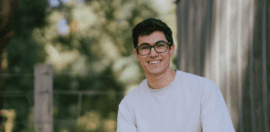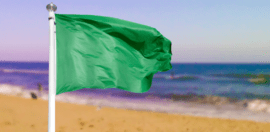The CEO teaching an old dog new tricks

2 September 2019 at 8:18 am
As the CEO of Guide Dogs Victoria, Karen Hayes AM DSJ is leading the charge on transforming the well-known and loved organisation into one of the most innovative charities of our time. She’s this week’s Changemaker.
When Hayes took over Guide Dogs Victoria in 2011 her priority was to breathe life back into the organisation that had served so many people with blindness or low vision over the last 60 years.
She was able to take what she had learnt from her many years in the corporate sector into the organisation that like many charities, was struggling to compete for increasingly limited government funding, and navigating the complex and competitive new world of the National Disability Insurance Scheme.
She is currently in charge of developing three new social enterprises – a vet, a day care centre for dogs, and a cafe, run out of the Guide Dogs Victoria campus in Melbourne, with the money feeding back to support the work of the charity.
She believes the move – which many charities are fearful of making – will set the organisation up for years to come.
In this week’s Changemaker, Hayes talks about why it’s important for charities to take risks, the challenges of moving from corporate to an NFP, and why she loves her job.
What inspired you to get started in the not-for-profit sector?
I had had a very successful career in the corporate world and enjoyed it a lot. I also started to sit on some not-for-profit boards. I was one of the founders of the Breast Cancer Network of Australia, and was on the board of the Melbourne Football Club. And I started to enjoy the work that I was doing in the not-for-profit boards more than I was enjoying my corporate role. It really came down to the fact that my values were much more aligned to the work I was doing in the non-profit boards. I started to look around for opportunities to lead an NFP and the Guide Dogs opportunity came up. I would say it’s been the best career move of my life.
Guide Dogs is such a well-known and loved charity. What was it like taking over the leadership in 2011?
I came in at a time where Guide Dogs really needed to be reinvented. With the introduction of the NDIS and the competition that was entering the market as a result of that, as well as the fact that the organisation was extremely well known, I felt there was a need for reinvention.
We celebrated our 60th anniversary as an organisation two years ago, and we needed to establish a business model that would ensure that we were around for the next 60 years, that was also able to accommodate the significant change in health reform through things like NDIS and My Aged Care. We had a team of incredibly dedicated people doing really, really great work, but we needed to focus on what we wanted it to look like further down the track and how we would continue to deliver quality services and a growing demand for our services when we still had a very high dependency on philanthropic funding.
It was a great opportunity for me to really draw on all of the skills that I developed in my corporate career, whether it’s stakeholder management, relationship management, business development, strategy development. Everything that I have ever done in my corporate career has prepared me for the role that I now have with Guide Dogs, which is a wonderful place to be.
You have turned to social enterprise as a way to diversify your funding streams. Why did you decide to do that?
Guide Dogs traditionally has received less than 10 per cent of its funding from the government and the rest has always come from the philanthropic community in the form of trusts, foundations and bequests. By introducing social enterprises like the vet clinic, doggy daycare, and the cafe that we’re planning to build over the course of the next couple of years, it will introduce more predictability, more diversity and more sustainability into our revenue streams.
We will always have a very high dependence on philanthropic funding because we’ve taken a position that regardless of whether anybody has a funding package or not through the NDIS or otherwise, we will always provide our customers with services. Therefore, we will always have a very high dependence on the philanthropic community to fund our services. But we see these social enterprises as an opportunity to diversify our revenue streams and really balance out where that revenue is coming from.
What advice would you give to someone who is looking to do what you did and move into the not-for-profit sector from the corporate world?
There’s never enough hours of the day and there’s never enough money to do what you need to do. But it is without question the most rewarding role I’ve ever had. And once again, I see that the skills I’ve developed over the years in my corporate role have really prepared me for my role in the not-for-profit sector. I think the reason for that is the not-for-profit sector is becoming increasingly competitive. Access to government funds and philanthropic funds is getting much more difficult and therefore you need to be quite innovative around how you introduce relationships, how you develop partnerships with other organisations to deliver better solutions for your clients, but also how you can attract and retain the very best people to deliver your services.
It’s not unlike the corporate environment in terms of demand on your time, and clients you need to deliver a quality result for, and making money in the process. What is different, is the number of stakeholders that you are managing. You have government, you have donors, you have requesters, you have staff, you have clients, and volunteers. You need to be prepared for the fact that it will be a very demanding but rewarding role. And there are many stakeholders that need to be considered in everything that you do. But at the end of the day, for Guide Dogs Victoria, our clients sit at the centre of our universe and are the key to every single decision that we make.
What’s the best part about your job?
Everybody would say the puppies. You never, ever get tired of cuddling a puppy. And puppies only represent about 30 per cent of what we do, which will surprise a lot of people. I have a beautiful ambassador dog called Willow. Some people get a company car, I’ve got a company dog, and I definitely got the better end of the equation.
But I love the difference that we make in the lives of people who are blind or have low vision and their families. I also work with an amazing team of people, whilst I am the face of Guide Dogs, I absolutely stand on the shoulders of giants in this organisation. I’m so very, very proud of what we do and the difference that we make and the people that I work with.
What do you like to do in your downtime?
I love walking. Willow and I get out and walk every day. I’m also able to get down to the beach a bit and it’s one of my favourite things in the world to walk along the beach and clear the cobwebs and get some fresh air and enjoy this beautiful state that we live in. I love how I feel when I go to the beach and get that fresh air and walk along the beach with Willow and with my husband. It’s a pretty nice place to be.








